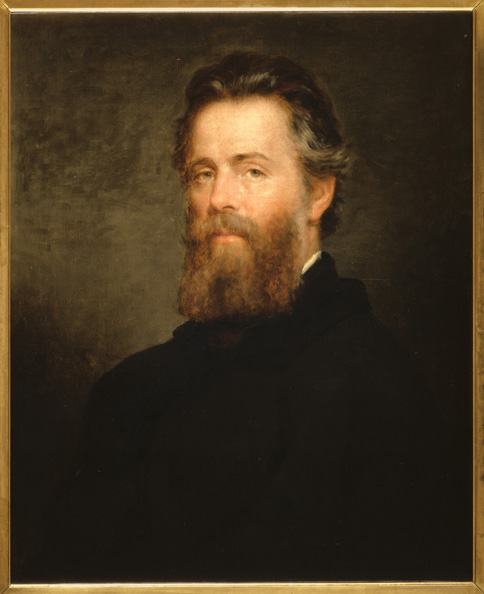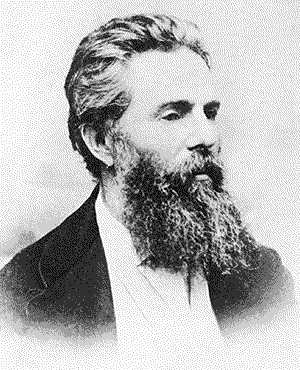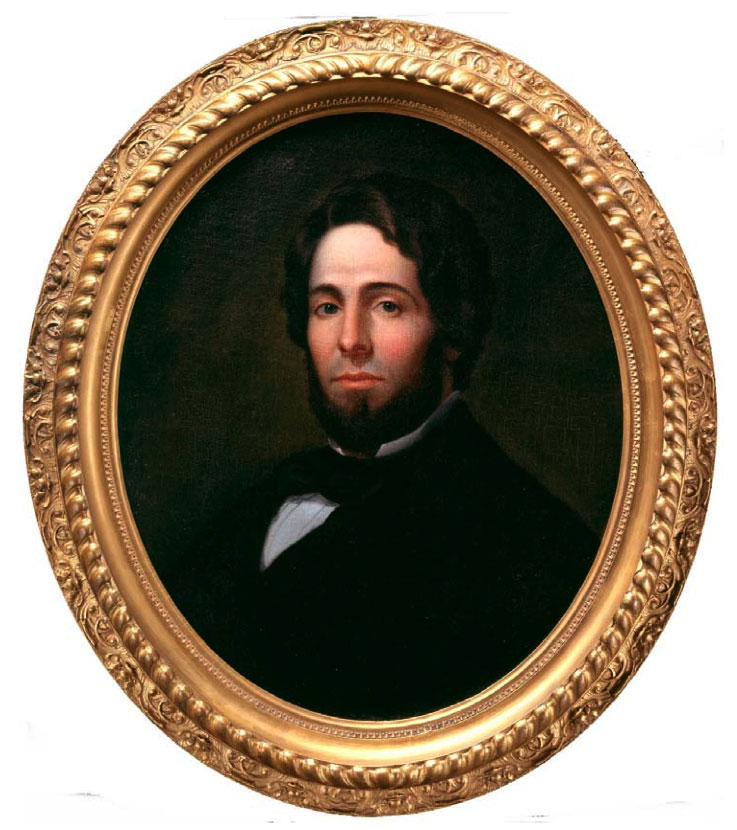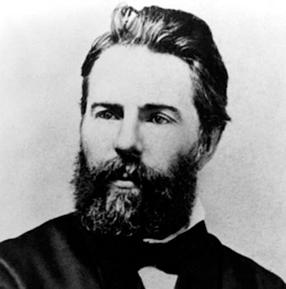
Herman Melville
[1819–1891]
HERMAN MELVILLE
[1 August 1819 – 28 Sept. 1891]
is
widely recognized as a prominent American literary figure. His most popular works are the sea adventure novels, 'Moby Dick', 'Typee', 'Omoo', 'Mardi', 'Redburn', 'Billy Budd', and 'White Jacket'.
In the early part of the 19th Century, Herman Melville opened his childhood eyes in 1819 and looked up to two
grandfathers who were in the higher ranks of the Revolutionary War, as they stood near to his parents, and who
were able to help his mother and father with their standard of living in mercantile trade in New York City. An
economic downturn in New York City, forced a family move later to the City of Albany New York. The resources of
the family were dwindling and his father Allan Melvill's business was not yielding returns adedquately to recover the
family business operations. Herman Melville, found himself suddenly having to manage work-a day farm tasks, and
work as a bank clerk, circa 1832. By 1838, Herman Melville's family had undergone bankruptcy proceedings and
they had to relocate to Lansingburgh, New York. Herman Melville's father Allan Melvill did manage to send him to
Albany Academy, and Herman Melville took a teaching position at a Pittsfield school. He had studied to get a
surveyor's job in Lansingburgh but did not land a job performing the surveying work at that time.
In 1841, Herman Melville shipped out aboard the whaler Acushnet, that was sailing from New Bedford to the South
Seas. He endured the heavy and dangerous work of taking on the harpooned baleen whale to string it a lee and
witnessed first hand all the rendering that was needed to get barrels of whale oil stowed in the hold until the ship
could dock in a distant port to transfer the cargo to those faster transit ships who could bring it for a good price to
the American shores. That was, Melville did work on the Acushnet until August 9, 1841, until he and a shipmate he
knew decided to hide on a Marquesa Island named Taipi so as to avoid their orders given to them by the first mate.
Scurrying off, and hiding themselves in the verdant greenery of the island, they felt themselves to be lightening their
onerous, back-breaking ship work schedules. The two mutineers remained hid, and managed to find help by
expressing their hopes to the island's natives, by avoiding being found out to be hapless bereft sailors with little
food to give in case they were desired by the rumored local cannibals, and by receiving some food from the
Protestant and the Catholic missionaries they found on the island. Melville and his companion needed to get far,
far away from the smell of whale oil, but their 9 week ordeal of running and hiding was soon to be over. An
Australian ship picked them up from Taipi, and they were brought to Hawaii, and had to wait a number of months
there in moderate confinement, being relieved when they finally sign on to a U.S. ship bound for New York.
In 1846, Herman Melville got funding from his brother to publish the book named 'Typee, A Peep at Polynesian Life',
and he received an early endorsement from the poet Walt Whitman. Buoyed by that success, Melville also wrote a
second book named 'Omoo: A Narrative of Adventures in the South Seas'. With funding from those popular books, he then married
Elizabeth Shaw, a family that was friends with the Melvilles, and Lemuel Shaw, Elizabeth's father, was to play a
role in keeping the positive trend toward popular fiction in the black, instead of in the red. The Literary World
magazine helped boost the popularity of many New York authors including Edgar Alan Poe, Washington Irving, and
N.P. Ellis.
By 1849 Melville then begins to consider bringing other topics out by bringing in a group of novels such as 'Mardi: A
Voyage Thither' and a few other works that did not appeal to Melville's existing audience at that time.
In 1850 - 1851, Melville guessed that the reading public could be enticed by a monumental work that brought in
new eponymous characters, like Ahab in his rage, and even Ishmael and his cowering shipmates, being lost at sea,
or injured in heavy seas in rowboats, or crawling across the decks of the Pequod in their agony to quell Ahab who
burned for revenge on the white whale. This great work was titled, 'Moby-Dick, or, The Whale'. Unfortunately, at that time, Melville's audience
could not make sense of the dreary lectures by Ahab with the burning zealot's accusatory craggy forehead, and
were feeling cozened by the author, who was leading them to conclude that whaling captains are not all mission-
ready, and their money for the thick tome was a bad bet. Only people who could be capable of changing their
sensible world-view would be able to unravel the theme of the dark and forceful novel that brought a white whale to
be angry enough to be reckoned more of a threat than Ahab had planned.
The property of Arrowhead in Pittsfield, Massachusetts was bought to house Herman Melville's family while he
worked on this book, and Nathaniel Hawthorne became good friends with Herman Melville because of his proximity
to the Village of Lenox in Massachusetts. Melvile brings out the book 'White Jacket, or the World, In a Man-of-War',
(1850) but the effort lacked a good audience.
In 1852. Herman Melville published 'Pierre, or the Ambiguities', but the literary world did not respond with the
interest which Melville sought. He starts seeking an audience for other works, 'Bartleby the Scrivener' (1853), 'Confidence Man' (1857), 'Battle Pieces and Aspects of War' (1866), and 'Clarlel' (1876). Melville began his final work 'Billy Budd' in 1888. He died of a heart attack three years later in September 1891.
- Written by D.G. Palladino
Herman Melville on the Web:
Melville.orgThis site has some good information surrounding the history and criticism of the works.
Photo Gallery


|
|
THE COLLECTION OF LITERARY WORKS
ArtWritten By Herman Melville
BuddhaWritten By Herman Melville
DirgeWritten By Herman Melville
DirgeWritten By Herman Melville
GoldWritten By Herman Melville
LyonWritten By Herman Melville
MonodyWritten By Herman Melville
OmooWritten By Herman Melville
ShilohWritten By Herman Melville
SyraWritten By Herman Melville
To NedWritten By Herman Melville
TypeeWritten By Herman Melville
VeniceWritten By Herman Melville
|


Quotes:
"There is no dignity in wickedness, wheter in purple or rags; and hell is a democracy of devils, where all are equals."
- Redburn
"A smile is the chosen vehicle of all ambiguities."
- Pierre
"Is there some principal of nature which states that we never know the quality of what we have until it is gone?"
- Melville
"Let us speak, though we show all our faults and weaknesses, for it is a sign of strength to be weak, to know it and out with it, not in a set way and ostentatiously, though, but incidentally and without premeditation."
- Melville
"There are certain queer times and occasions in this strange mixed affair we call life when a man takes this whole universe for a vast practical joke, though the wit thereof he but dimly discerns, and more than suspects that the joke is at nobody’s expense but his own. However, nothing dispirits, and nothing seems worth while disputing. He bolts down all events, all creeds, and beliefs, and persuasions, all hard things visible and invisible, never mind how knobby; as an ostrich of potent digestion gobbles down bullets and gun flints. And as for small difficulties and worryings, prospects of sudden disaster, peril of life and limb; all these, and death itself, seem to him only sly, good-natured hits, and jolly punches in the side bestowed by the unseen and unaccountable old joker."
- Moby Dick
"But there is a touch of divinity even in brutes, and a special halo about a horse, that should forever exempt him from indignities. As for those majestic, magisterial truck-horses of the docks, I would as soon think of striking a judge on the bench, as to lay violent hand upon their holy hides."
- Redburn
"All we discover has been with us since the sun began to roll; and much we discover, is not worth the discovering."
- Mardi
"Real strength never impairs beauty or harmony, but it often bestows it; and in everything imposingly beautiful, strength has much to do with the magic. Take away the tied tendons that all over seem bursting from the marble in the carved Hercules, and its charm would be gone."
- Moby Dick
"But it is better to fail in originality, than to succeed in imitation. He who has never failed somewhere, that man cannot be great. Failure is the true test of greatness. And if it be said, that continual success is a proof that a man wisely knows his powers,—it is only to be added, that, in that case, he knows them to be small."
- Hawthorne and his Mosses
"My lord, at bottom, men wear no bonds that other men can strike off; and have no immunities, of which other men can deprive them. Tell a good man that he is free to commit murder,—will he murder? Tell a murderer that at the peril of his soul he indulges in murderous thoughts,—will that make him a saint?"
- Mardi
"It is not down in any map; true places never are."
- Moby Dick
"The effulgence takes an amber glow
Which bathes the hill-side villas far;
Affrighted ladies mark the show
Painting the pale magnolia—"
- Running the Batteries
"My lord, there are heroes without armies, who hear martial music in their souls."
- Mardi
"I love to sail forbidden seas, and land on barbarous coasts. Not ignoring what is good, I am quick to perceive a horror, and could still be social with it—would they let me—since it is but well to be on friendly terms with all the inmates of the place one lodges in."
- Moby Dick
"Among all the innate, hyena-like repellants to the reception of any set form of a spiritually-minded and pure archetypical faith, there is nothing so potent in its skeptical tendencies, as that inevitable perverse ridiculousness, which so often bestreaks some of the essentially finest and noblest aspirations of those men, who disgusted with the common conventional quackeries, strive, in their clogged terrestrial humanities, after some imperfectly discerned, but heavenly ideals: ideals, not only imperfectly discerned in themselves, but the path to them so little traceable, that no two minds will entirely agree upon it."
- Pierre
"Truth uncompromisingly told will always have its ragged edges; hence the conclusion of such a narration is apt to be less finished than an architectural finial."
- Billy Budd
"I know it may be said that the whole nature of this naval code is purposely adapted to the war exigencies of the Navy. But waiving the grave question that might be raised concerning the moral, not judicial, lawfulness of this arbitrary code, even in time of war; be it asked, why it is in force during a time of peace? The United States has now existed as a nation upward of seventy years, and in all that time the alleged necessity for the operation of the naval code—in cases deemed capital—has only existed during a period of two or three years at most."
- White Jacket
"He who is frank, will often appear vain, my lord. Having no guile, he speaks as freely of himself, as of another; and is just as ready to honor his own merits, even if imaginary, as to lament over undeniable deficiencies. Besides, such men are prone to moods, which to shallow-minded, unsympathizing mortals, make their occasional distrust of themselves, appear but as a phase of self-conceit. Whereas, the man who, in the presence of his very friends, parades a barred and bolted front,—that man so highly prizes his sweet self, that he cares not to profane the shrine he worships, by throwing open its portals. He is locked up; and Ego is the key. Reserve alone is vanity. But all mankind are egotists. The world revolves upon an I; and we upon ourselves; for we are our own worlds:—all other men as strangers, from outlandish, distant climes, going clad in furs. Then, whate'er they be, let us show our worlds; and not seek to hide from men, what Oro knows."
- Mardi
|
What's New
| 4 May 2019: |
The Herman Melville section of this website is going live! |
|
|

